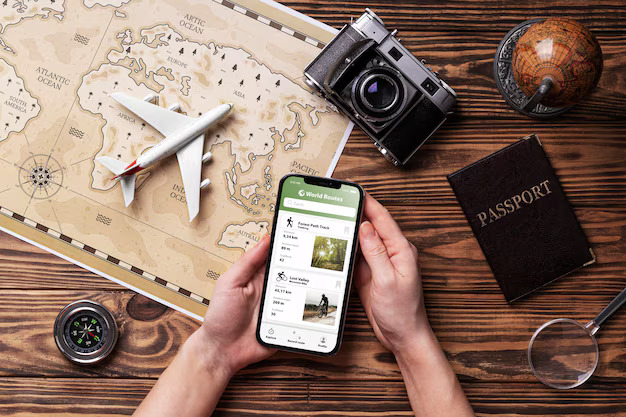Once upon a time, travel meant guidebooks, paper maps, and travelers’ checks. Today, a tap on your smartphone can summon a ride, unlock a hotel room, translate a foreign menu, and even build a personalized itinerary in seconds. Welcome to the age of Smart Travel — where technology and travel converge to create seamless, efficient, and deeply personalized journeys.
As the travel industry continues to evolve, tech integration is no longer a luxury or a trend — it’s the backbone of modern exploration. Whether you’re a budget backpacker, a digital nomad, or a business jet-setter, smart travel tools are redefining what it means to be mobile, connected, and informed on the go.
In this blog, we’ll dive into the smart tech revolution in travel: its origins, key innovations, current applications, benefits, and what the future holds.
🔍 What Is Smart Travel?
Smart travel refers to the use of digital technologies, AI, and connected systems to enhance the travel experience — from trip planning and booking to navigation, accommodation, and post-travel sharing.
It includes:
- Mobile apps and digital platforms
- AI and machine learning for personalization
- IoT (Internet of Things) in hotels, airports, and vehicles
- Augmented reality (AR) and virtual reality (VR)
- Biometric security and smart payments
The result? A travel experience that’s faster, safer, more personalized, and more environmentally efficient.
🧳 A Timeline of Travel Tech Evolution
- 1990s: Online booking systems like Expedia and Travelocity go live
- Early 2000s: e-Tickets replace paper boarding passes; smartphones begin to emerge
- 2010s: Rise of travel apps (Google Maps, Airbnb, Uber, TripAdvisor); mobile boarding; digital check-ins
- 2020s: AI, biometrics, smart hotels, contactless payments, and virtual assistants become standard
🚀 Key Areas Where Technology Has Transformed Travel
1. 🧠 AI-Powered Personalization
Modern travelers expect tailored experiences. Thanks to AI:
- Travel platforms recommend flights, hotels, and tours based on your habits.
- Chatbots like Expedia’s or Kayak’s handle queries 24/7.
- Apps like Hopper predict the best time to book flights and hotels using historical data.
2. 📲 Mobile Apps & Real-Time Convenience
Mobile is now the ultimate travel companion:
- Digital wallets for boarding passes and hotel keys (Apple Wallet, Google Wallet)
- Real-time language translation via Google Translate or iTranslate
- City guides, transit maps, itinerary planners — all in your pocket
3. 🛂 Biometrics & Seamless Security
Airports around the world are adopting:
- Facial recognition at check-in, immigration, and boarding
- Fingerprint and iris scanning for contactless verification
- eGates and Smart Borders that reduce queues and waiting time
4. 🏨 Smart Hotels & Accommodation
Hotels are becoming tech-driven, offering:
- Mobile room keys via apps
- Voice-activated assistants (Alexa for Hospitality, Google Nest)
- Room automation for lighting, temperature, and entertainment
- Chat-based concierge services instead of traditional front desks
5. 🚘 Smart Mobility & Transportation
Transportation has become smarter and more sustainable:
- Rideshare apps (Uber, Lyft, Ola) offer route optimization
- eScooters and eBikes allow micro-mobility in cities
- Real-time transit tracking through apps like Moovit or Citymapper
- Self-driving vehicles and EV car rentals are rising in urban centers
6. 🗺️ AR, VR, and Mixed Reality Experiences
- AR apps overlay historical data or restaurant reviews on your screen as you explore.
- VR allows virtual tours of destinations, hotels, or museums before you even travel.
- Google Lens lets you scan signs and objects in foreign languages instantly.
7. 💳 Digital Payments & Travel Fintech
Smart payments reduce the friction of currency exchange:
- Contactless cards, QR code payments, and mobile wallets (Paytm, Apple Pay, etc.)
- Multi-currency travel cards like Wise or Revolut
- Instant splitting of bills and group travel budgets via apps like Splitwise or Tricount
🌍 Smart Travel for Sustainable Tourism
Smart travel is also making travel more eco-conscious and efficient:
- Apps like Ecosia Travel and Goodwings offset carbon emissions from bookings.
- Smart energy systems in hotels reduce waste and automate power saving.
- Real-time data helps reduce over-tourism by alerting travelers about crowded areas.
🧑💻 Smart Travel for Digital Nomads & Remote Workers
The rise of remote work has fueled tech-integrated travel lifestyles:
- Co-living and co-working spaces in exotic locations
- Virtual SIMs and eSIMs for global mobile data (e.g., Airalo, Holafly)
- VPNs, cloud storage, and productivity apps to stay connected and secure
- Nomad visas and travel management tools like SafetyWing, Nomad List, and Workfrom
📉 Challenges and Considerations
While smart travel offers convenience, it also comes with risks:
⚠️ Privacy Concerns
Biometric tracking, app data, and online footprints raise questions about data security and surveillance.
⚠️ Digital Dependency
Overreliance on technology can reduce spontaneity, local interaction, and cultural immersion.
⚠️ Tech Exclusion
Not all travelers have equal access to devices or internet, creating a digital divide in the travel experience.
🔮 What’s Next in Smart Travel?
The future is only getting smarter. Here’s what’s on the horizon:
- AI-powered travel agents that plan entire trips via voice commands
- Blockchain-based passports and visa systems
- Hyperloop and flying taxis for ultra-fast urban travel
- Augmented reality glasses replacing phones as the main travel device
- Predictive health screening in airports for post-pandemic safety
✈️ Final Thoughts: Tech-Powered Travel with a Human Touch
Smart travel is more than flashy gadgets — it’s about enhancing experiences, removing friction, and empowering people to travel smarter, longer, and safer. But as we embrace innovation, we must also remember that the essence of travel lies in curiosity, empathy, and discovery — values that no app or algorithm can replace.
In the end, the smartest travelers are not just those who use technology — but those who use it wisely to unlock deeper, more meaningful journeys.


